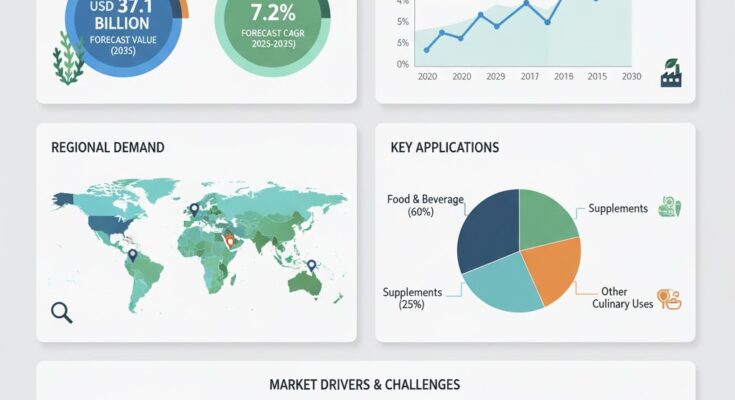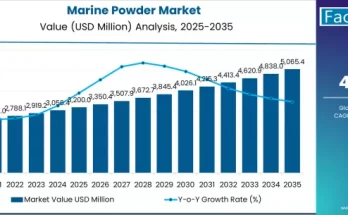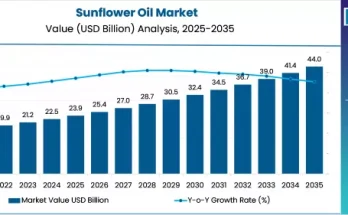The global palmaria palmata bacon market is gaining remarkable traction as consumers, food innovators, and retailers shift toward sustainable and plant-based protein sources. According to a recent report by Fact.MR, the market is projected to grow from USD 18.5 million in 2025 to approximately USD 37.1 million by 2035, recording an absolute increase of USD 20.0 million over the forecast period. This translates into a total growth of 108.1%, with the market forecast to expand at a compound annual growth rate (CAGR) of 7.2% between 2025 and 2035.
This strong upward trend reflects growing consumer awareness of seaweed’s nutritional benefits, sustainability advantages, and versatility as a clean-label, plant-based alternative to conventional bacon. As climate-conscious eating and alternative proteins become mainstream, Palmaria palmata (commonly known as dulse) is emerging as a high-value ingredient in the global food innovation landscape.
Strategic Market Drivers
- Rising Demand for Plant-Based and Sustainable Proteins
With consumers increasingly seeking eco-friendly food options, Palmaria palmata offers a natural, ocean-farmed protein source that requires no freshwater, pesticides, or arable land. Its umami flavor and crisp texture make it a popular bacon substitute for vegan and flexitarian consumers, aligning with global sustainability and health trends.
- Nutritional and Functional Advantages of Palmaria Palmata
Rich in essential amino acids, omega-3 fatty acids, vitamins, and minerals, dulse-based bacon delivers both taste and health benefits. Its natural source of iodine, iron, and antioxidants appeals to wellness-focused consumers, while its functional versatility enables use in ready-to-eat snacks, breakfast items, and gourmet plant-based recipes.
- Expansion of Plant-Based Food Innovations
Food manufacturers and startups are investing in R&D to enhance the sensory and textural qualities of Palmaria palmata bacon. Advances in drying, roasting, and flavor infusion technologies have led to superior shelf stability, flavor retention, and consumer appeal—fueling strong retail and foodservice adoption.
- Clean Label and Ocean Sustainability Initiatives
The seaweed industry’s low carbon footprint and regenerative potential make it a cornerstone of blue economy initiatives. Companies are emphasizing traceability, ethical sourcing, and sustainable aquaculture practices, catering to the growing segment of environmentally conscious consumers.
Regional Growth Highlights
North America: Early Adoption and Product Innovation
North America leads the Palmaria palmata bacon market, driven by rapid adoption of plant-based foods and rising consumer demand for innovative, eco-friendly meat alternatives. The U.S. market, in particular, benefits from a strong network of vegan food brands and retailers introducing seaweed-based snacks and breakfast products.
Europe: A Hub for Sustainable Seaweed Cultivation
Europe is emerging as a key producer and consumer of Palmaria palmata, with countries such as Ireland, Norway, and Iceland advancing large-scale seaweed aquaculture. The region’s strong regulatory support for sustainable food production and widespread vegan movement are expected to sustain long-term growth.
Asia-Pacific: High Production Potential
East Asia and coastal regions in the Pacific are poised to become major suppliers of dulse, thanks to favorable marine conditions and traditional seaweed consumption patterns. Governments and private investors in Japan, South Korea, and China are supporting aquaculture expansion to meet growing global demand.
Emerging Markets: Latin America and Oceania
Emerging regions are witnessing early-stage adoption of seaweed-based foods through health and specialty retail channels. Rising awareness of alternative proteins and government-led marine sustainability initiatives are creating future opportunities in these markets.
Market Segmentation Insights
By Product Type
- Smoked Palmaria Palmata Bacon – Gaining popularity for its authentic aroma and crisp texture.
- Raw & Dehydrated Palmaria Palmata – Used in culinary applications and functional food formulations.
- Flavored and Ready-to-Eat Varieties – Capturing demand from quick-service restaurants and convenience channels.
By End Use
- Retail (Household Consumption) – Driven by vegan, vegetarian, and flexitarian households.
- Foodservice & Restaurants – Adoption in gourmet, fast-casual, and breakfast-focused chains.
- Industrial Use (Ingredient Supply) – Integration into plant-based processed foods and functional snacks.
By Distribution Channel
- Supermarkets/Hypermarkets
- Health Food Stores
- Online Retail Platforms
- Specialty Vegan Stores
Challenges and Market Considerations
Despite promising growth, the Palmaria palmata bacon market faces several challenges:
- Supply Chain Limitations: Dependence on coastal cultivation and limited large-scale processing facilities may constrain output.
- Cost Competitiveness: Production costs for seaweed-based bacon remain higher than traditional pork alternatives.
- Consumer Education: Awareness about seaweed’s benefits and taste profile is still developing in emerging markets.
- Regulatory Variability: Differences in food labeling and import regulations across regions impact product commercialization.
Competitive Landscape
The Palmaria palmata bacon market is characterized by rapid innovation, sustainable sourcing initiatives, and strategic partnerships across the food and aquaculture sectors.
Key Players in the Palmaria Palmata Bacon Market:
- Ocean’s Harvest Ltd.
- SeaTaste Foods
- North Sea Organics
- Algae Delights
- MarineBacon Inc.
- Atlantic Sea Farms
- Maine Coast Sea Vegetables
- Pacific Harvest
- Seaweed & Co.
- Wild Atlantic Way Seaweed
These companies are focusing on expanding product lines, investing in advanced drying and flavor infusion technologies, and partnering with retailers to bring seaweed-based bacon to mainstream shelves. R&D efforts are also concentrated on enhancing texture, improving scalability, and extending shelf life while maintaining nutritional integrity.
Future Outlook: A Sustainable, Flavorful Future for Plant-Based Proteins
The global Palmaria palmata bacon market is on the cusp of a transformative decade, where sustainability, health consciousness, and innovation converge. As the demand for ocean-friendly protein alternatives continues to surge, Palmaria palmata bacon is expected to play a pivotal role in the evolution of the plant-based food landscape.
Manufacturers who combine sustainable sourcing, culinary excellence, and consumer education will be best positioned to lead this market. With robust growth prospects and expanding consumer appeal, the Palmaria palmata bacon industry is set to become a cornerstone of the future global food ecosystem—offering a delicious, nutritious, and planet-positive alternative to traditional bacon.



